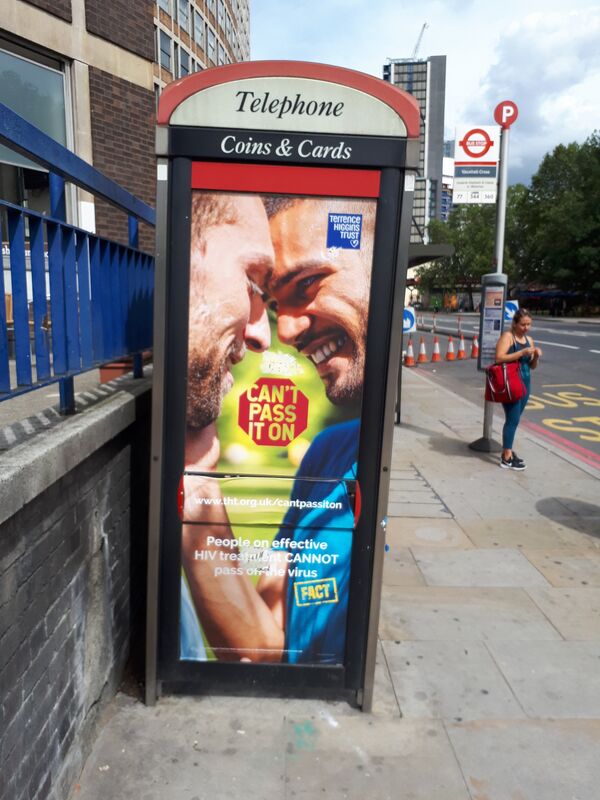Saturday, November 17, sees the start of National HIV Testing Week but the messages from experts in sexual health could not be further from the terrifying warnings circulating at the height of the AIDS panic in the late 1980s.
Instead of warning of the calamitous consequences of having unprotected sex, the Terrence Higgins Trust (THT) are conveying the message that people living with HIV can have enjoyable sex lives — including unprotected sex — as long as they are on effective treatment.
Show us those fingers! We want everyone to 'Give HIV the finger' and get tested this National HIV Testing Week.
— It Starts With Me (@startswith_me) 12 November 2018
So please tweet your finger photos with #HIVTestWeek and tag @startswith_me! And make sure you order your free ##HIV postal test via https://t.co/EHeVbe955Y pic.twitter.com/GvOaB0dyYa
Terrifying 'Tombstone Ads' Of 1980s
This is a long way from the "tombstone ads" of 1986.

Britain faced a mass panic about AIDS (Acquired Immune Deficiency Syndrome) — a disease which was ravaging the homosexual community in Europe and the US and also drug addicts who shared infected needles.
"It is a deadly disease and there is no known cure," intoned actor John Hurt, during a terrifying public information TV ad which featured a large tombstone.
In 1993 Tom Hanks starred in the Hollywood movie Philadelphia as an AIDS victim who was discriminated against by his employer because of his condition.
There are so many SWs working using the HIV med, PrEP & PEP
— Rene Joile ♡ International (@VIPReneJoile) 12 November 2018
It doesn't make natural sex safe. It doesn't protect you from STDs. It doesn't prevent HIV.
Please don't give in to requests like this. There is no money worth risking your life, or the wife he goes home to#safesex pic.twitter.com/t8k8zNS134
HIV (Human Immunodeficiency Virus) is the virus that can lead to AIDS if left untreated and can be fatal as the immune system cannot fight off infections.
In the last 20 years medical and social advances have changed an awful lot.
New drug treatments called ARTs have allowed people who have HIV to live longer lives without the virus ever progressing to AIDS.
Adherence to these treatments also enable many to have sex and families without ever passing on the virus.
I was diagnosed with HIV at age 11 in 1987. My parents were told I had 6 months-to-2 years to live. I’m turning 43 on Monday and I’ve spent the last two decades of my life educating about HIV through writing, speaking and laughter. https://t.co/DEbD4c7kil
— Shawn of the Bled (@shawndecker) 14 July 2018
A major study in 2014 showed 58,000 HIV positive people had sex without a condom with a partner who was HIV negative without passing on the virus.
But the study came with two conditions — firstly the HIV positive partner had to be on antiretroviral therapy (ART) and had to have a viral load under 200 copies/ml transmitted HIV.
'My Whole World Froze'
Andrew Gamez-Heath, 34, from Lincoln, got HIV from unprotected sex in 2014 and found out he had the virus in November of that year.
"I actually said to her ‘how long have I got?' and she said ‘exactly the same as before'. I wasn't educated. I didn't know anything. The first thing I thought of was emaciated bodies wasting away in hospital, like Tom Hanks in Philadelphia," Mr. Gamez-Heath told Sputnik.
"They repeated the test and then told me how things had changed. If it's caught early it doesn't need to affect your life at all. I just need to take one tablet a day and it suppresses the virus to an undetectable level so I can stay fit and healthy but I'm also not able to pass it on. I had no idea how far things had come," Mr. Gamez-Heath told Sputnik.
"My partner's reaction was amazing. He was a nurse, so he knew a lot more than me. He said ‘we're going to be ok. This changes nothing'," Mr. Gamez-Heath told Sputnik.
In 2016 he married his Spanish boyfriend, Ricardo, and he now works for a charity which educates people about sexual health.
From 36 Tablets a Day to One
"Things have changed so much. I have a client who told me that in 1993 he had to take 36 tablets a day. Now it's just one," Mr. Gamez-Heath told Sputnik.
Despite the advancement in treatments THT said it was vital that people — especially those in high risk groups — got tested regularly.
A tiny minority of people with HIV stick their heads in the sand and refuse to get treatment.
When they then knowingly pass on the virus to others they are then liable for prosecution for grievous bodily harm.
He knew he was "riddled with HIV" and deliberately tampered with condoms he was using to make sure his sexual partners caught the virus.
Every week 7000 young #women acquire #HIV. Find out more about women and girls and HIV in this @UNAIDS factsheet. https://t.co/fcv0tXhnWe pic.twitter.com/ZGmLJt43fc
— STOPAIDS (@STOPAIDS) 11 November 2018
Rowe's crimes were described as a "determined hateful campaign of sly violence".
In September this year Japhet Osei, 23, from Reading, Berkshire, was jailed for five years for infecting two women with HIV in 2015 and 2016.
Relaxation of Ban on Gay Men Donating Blood
In the 1980s and 90s some people contracted HIV through blood transfusions, which led to a long ban on gay and bisexual men being able to donate blood, a rule which was finally relaxed in the US in 2014 and in the UK in 2017.
THT says there is "currently no cure for HIV" but it says that with early diagnose and effective treatment, like ART, people with HIV will not develop AIDS and will have a life expectancy virtually the same as people who are not HIV positive.
Scientists are also working on even more advanced medicines.
A clinical trial in Australia has provided evidence that a drug may have been invented which would actually make people immune from acquiring HIV.
An Israeli company touted a fake "potential HIV cure" following "trials" in Uganda. Now, it admits its "trial" wasn't registered and it can't explain the poor treatment it gave trial patients. https://t.co/fsJgZxgqxi pic.twitter.com/XMJLEvfNmm
— GIJN Africa (@gijnAfrica) 11 November 2018
In 2016 New South Wales state began trialling the pre-exposure prophylaxis drug PrEP and offered it to HIV-negative people who were in high-risk groups, such as gay and bisexual men.
Professor Andrew Grulich, from the Kirby Institute at UNSW Sydney, said the study followed 3,069 gay and bisexual men and only two of the men acquired HIV, and neither of whom had been taking PrEP as prescribed.
PrEP is now available in Scotland and Wales, but not in England or Northern Ireland.
A PrEP trial has been launched in England and 13,000 people are being recruited.
FACT: More than 50% of the population of people living with HIV are women. Join me, @glblctzn, and @JNJCares by sharing this video to #makeHIVhistory! pic.twitter.com/z5BIGjVbgT
— Official Global Citizen🇿🇦 (@MinaNamanje) 12 November 2018
Although AIDS is no longer a death sentence in the UK or other developed countries, it is still claiming lives in Africa and other parts of the world where people do not have access to treatment.



